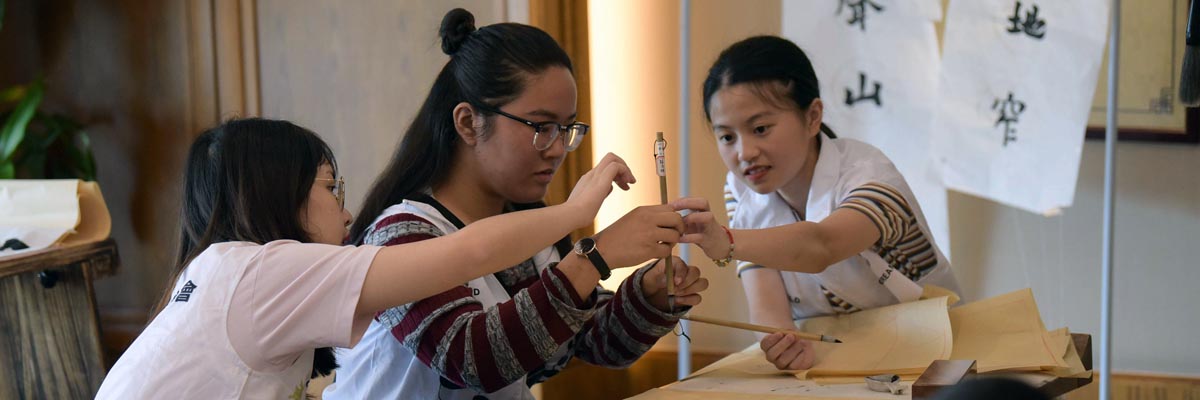Chengdu Courses – 2026 January Session
Academic Program
You will take one, three-credit course during the January session. Courses are small and meet daily for a minimum of three hours plus homework outside of class. The intimate class size allows for meaningful discussions and close interaction with your professor and other students. Chengdu is an excellent location to study language and the program offers you lots of individualized attention to improve your language skills quickly in a short amount of time. 1:1 tutorials for more advanced students may be arranged on request.
Courses offered
Click the course title to view course details and descriptions. Course availability is contingent upon student enrollment and is subject to change.
- January SessionChinese 200-level 3 credits Taught in Chinese
This course is for the third-year students of the modern Chinese language and the equivalent (i.e., those who have completed primary Chinese language at the elementary and intermediate level). This course is designed to develop further the students’ listening comprehension, speaking skills, grammar, reading and writing proficiency in Chinese. Various activities - discussions, oral presentations, conversions - will provide the opportunity to practice speaking and listening. Class participation is therefore essential. In addition, outside classroom activities such as shopping, going to a restaurant, interviewing people according to the given topics are included.
Prerequisite: two semesters of college-level Chinese, or equivalent
- January SessionChinese 200-level 3 credits Taught in Chinese
This course is a continuation of Intermediate Chinese I and is designed to further develop the students’ listening comprehension, speaking skills, reading and writing proficiency in Chinese. New grammar points will be introduced, and selected grammar points are reviewed during class sessions. Various activities - discussions, oral presentations, conversions - will provide the opportunity to practice on speaking and listening, class participation is therefore essential.
Prerequisite: three semesters of college-level Chinese, or equivalent
- January SessionChinese 300-level 3 credits Taught in Chinese
This course is for the third-year students of the modern Chinese language and the equivalent (i.e., those who have completed primary Chinese language at the elementary and intermediate level). This course is designed to develop further the students’ listening comprehension, speaking skills, grammar, reading and writing proficiency in Chinese. Various activities - discussions, oral presentations, conversions - will provide the opportunity to practice speaking and listening. Class participation is therefore essential. In addition, outside classroom activities such as shopping, going to a restaurant, interviewing people according to the given topics are included.
Prerequisite: four semesters of college-level Chinese, or equivalent
- January SessionChinese World Languages and Literatures 200-level 3 credits Taught in Chinese
Chinese Conversation is designed to help students navigate in a Chinese speaking society. Subjects and themes will be tailored to facilitate the needs of visiting students, and vocabulary study will reflect what students are likely to encounter in daily life. Complete understanding of the brief grammar section will be paramount to a student’s success. However, it will still primarily emphasize speaking and listening comprehension. Study of written Chinese will be limited to what will be necessary for students to engage themselves in daily life.
Prerequisite: two semesters of college-level Chinese, or equivalent
- January SessionChinese 200-level 3 credits Taught in English
Students will evaluate Chinese culture and society by means of a descriptive and analytic survey of chosen topics. While focusing on the cultural and social mainstream of contemporary China, the course also presents and analyzes various historic events, legends, traditions, ancient philosophies, religions and social norms in a sociological and economic perspective so as to enable students to have a better understanding of the evolution of and interactions between the Chinese culture and society.
Field trips to museums and theatre of Sichuan opera are part of the course.
Major topics include but are not limited to the following:
• Social Norms as Reflected in the Chinese Characters
• Taoism, Buddhism, Confucianism and Their Influence on the Chinese Culture and Society
• Chinese Ethnic Minorities
• Education in China
• Sex, Marriage and Family Life in China, Today and the Past
• Family Plan and Birth Control
• Cultural Revolution
• China’s Economic Reform and Opening Up Policies
• Holidays and Traditional Festivals: Their Folkloric Origin and Modern Impacts
To request a course syllabus: syllabus@usac.edu

